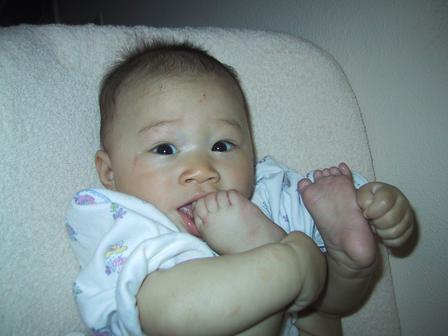Monday, May 31, 2004
It's midnight. Do you know where your child is?
We do! Check out "Izzy-Cam". This is a Linksys web camera pointed into Isabella's crib. (takes a while to boot up) I hope these waves don't cause brain damage!


Friday, May 28, 2004
Fun with the new digital SLR
We just bought the Canon Digital Rebel SLR. LOVE IT. Pictures exponentially higher quality than the Canon Elph and the Casio Exilim! Just compare the colors from this picture with all others.


Thursday, May 27, 2004
Isabella eats her toes
Isabella literally puts her foot in her mouth!


Monday, May 17, 2004
Stomach flu - bleah!
Stomach Flu (Viral Gastroenteritis)
What is stomach flu?
Stomach flu is a viral infection that affects the stomach and small intestine. It is also called viral gastroenteritis. The illness is usually brief, lasting 1 to 3 days.
How does it occur?
Gastroenteritis is caused by swallowing certain viruses. The body fluids of infected people contain the virus, sometimes even before their symptoms begin. The virus can be spread by direct contact with an infected person (for example, kissing or shaking hands) or by sharing food, drink, or eating utensils.
The virus enters the stomach and intestine and inflames the lining of these organs. As a result, the stomach and intestine are temporarily unable to perform their usual functions. The virus can also cause food to move more rapidly through your gastrointestinal (GI) tract.
Some bacteria and other tiny organisms called protozoa can cause infections that have symptoms similar to those of stomach flu.
What are the symptoms?
When you have stomach flu, you may have one or more of the following symptoms:
• fatigue
• chills
• loss of appetite
• nausea
• vomiting
• stomach cramps
• diarrhea
• low-grade fever
• muscle aches.
The illness may develop over a period of hours, or it may suddenly start with stomach cramps, vomiting, or diarrhea.
How is it diagnosed?
Your health care provider will review your symptoms. He or she may examine you and order lab tests to rule out more serious illnesses, such as appendicitis, and to detect complications, such as dehydration.
How is it treated?
The most important thing to do is to rest the stomach and intestines. You can do this by first eating nothing and drinking only clear liquids. A little later you can eat soft bland foods that are easy to digest.
During the vomiting phase of the illness it is best to have only small, frequent sips of liquids.
Drinking too much at once, even an ounce or two, may cause more vomiting.
Your choice of liquids is important. If water is the only liquid you can drink without vomiting, that is okay. However, if you have been vomiting frequently for a long time, you must replace the minerals, sodium and potassium, that are lost when you vomit. Ask your health care provider what sport drinks or medical products could help you replace these minerals.
Other clear liquids you can drink are weak tea and apple juice. You may also drink soft drinks without caffeine (such as 7 UP) after letting them lose some of their carbonation (go flat). Chilling the liquids may help you keep them down. Avoid liquids that are acidic (such as orange juice) or caffeinated (such as coffee) or have a lot of carbonation. Do not drink milk until you no longer have diarrhea.
You may start eating soft bland foods when you have not vomited for several hours and are able to drink clear liquids without further upset. Soda crackers, toast, noodles, applesauce, and bananas are good first choices. Avoid foods that are acidic, spicy, fatty, or fibrous (meats, coarse grains, vegetables) and dairy products. You may start eating these foods again in 3 days or so, when all signs of illness have passed.
Sometimes treatment includes prescription medicine to prevent nausea and vomiting or diarrhea. Nonprescription medicine is available for the treatment of diarrhea and is very effective. If you use it, make sure you use the dose recommended on the package. Before you use any medicine
for diarrhea, always check with your health care provider first.
If you have been vomiting for more than a day or have had diarrhea for over 3 days, call your health care provider. You may need to have a physical exam to rule out more serious problems and to check for dehydration. You may also need to have lab tests to determine whether bacteria or protozoa are causing your illness.
Dehydration is a potentially serious complication of stomach flu. It can occur if your body loses too much fluid because you keep vomiting or having diarrhea. If you are severely dehydrated, you may need to be given fluids intravenously (IV). In children and the elderly, dehydration can quickly become life threatening.
How long do the effects last?
Stomach flu rarely lasts longer than 1 to 3 days. However, it may be 1 to 2 weeks before your bowel habits return completely to normal.
Call your health care provider if:
• You continue to have severe symptoms for more than 2 or 3 days.
• Minor symptoms persist for several days (for example, loss of appetite, nausea, diarrhea).
• You develop symptoms that are not usually caused by stomach flu, such as blood in your vomit or bloody diarrhea.
How can I take care of myself?
Rest your stomach and intestines by following the guidelines above, but make sure you prevent dehydration by drinking enough liquids. Drink just small amounts frequently during the vomiting phase of your illness.
What can I do to help prevent stomach flu?
The single, most helpful way to prevent the spread of stomach flu is frequent, thorough hand washing. Also, avoid contact with the body fluids of an infected person, including saliva.
What is stomach flu?
Stomach flu is a viral infection that affects the stomach and small intestine. It is also called viral gastroenteritis. The illness is usually brief, lasting 1 to 3 days.
How does it occur?
Gastroenteritis is caused by swallowing certain viruses. The body fluids of infected people contain the virus, sometimes even before their symptoms begin. The virus can be spread by direct contact with an infected person (for example, kissing or shaking hands) or by sharing food, drink, or eating utensils.
The virus enters the stomach and intestine and inflames the lining of these organs. As a result, the stomach and intestine are temporarily unable to perform their usual functions. The virus can also cause food to move more rapidly through your gastrointestinal (GI) tract.
Some bacteria and other tiny organisms called protozoa can cause infections that have symptoms similar to those of stomach flu.
What are the symptoms?
When you have stomach flu, you may have one or more of the following symptoms:
• fatigue
• chills
• loss of appetite
• nausea
• vomiting
• stomach cramps
• diarrhea
• low-grade fever
• muscle aches.
The illness may develop over a period of hours, or it may suddenly start with stomach cramps, vomiting, or diarrhea.
How is it diagnosed?
Your health care provider will review your symptoms. He or she may examine you and order lab tests to rule out more serious illnesses, such as appendicitis, and to detect complications, such as dehydration.
How is it treated?
The most important thing to do is to rest the stomach and intestines. You can do this by first eating nothing and drinking only clear liquids. A little later you can eat soft bland foods that are easy to digest.
During the vomiting phase of the illness it is best to have only small, frequent sips of liquids.
Drinking too much at once, even an ounce or two, may cause more vomiting.
Your choice of liquids is important. If water is the only liquid you can drink without vomiting, that is okay. However, if you have been vomiting frequently for a long time, you must replace the minerals, sodium and potassium, that are lost when you vomit. Ask your health care provider what sport drinks or medical products could help you replace these minerals.
Other clear liquids you can drink are weak tea and apple juice. You may also drink soft drinks without caffeine (such as 7 UP) after letting them lose some of their carbonation (go flat). Chilling the liquids may help you keep them down. Avoid liquids that are acidic (such as orange juice) or caffeinated (such as coffee) or have a lot of carbonation. Do not drink milk until you no longer have diarrhea.
You may start eating soft bland foods when you have not vomited for several hours and are able to drink clear liquids without further upset. Soda crackers, toast, noodles, applesauce, and bananas are good first choices. Avoid foods that are acidic, spicy, fatty, or fibrous (meats, coarse grains, vegetables) and dairy products. You may start eating these foods again in 3 days or so, when all signs of illness have passed.
Sometimes treatment includes prescription medicine to prevent nausea and vomiting or diarrhea. Nonprescription medicine is available for the treatment of diarrhea and is very effective. If you use it, make sure you use the dose recommended on the package. Before you use any medicine
for diarrhea, always check with your health care provider first.
If you have been vomiting for more than a day or have had diarrhea for over 3 days, call your health care provider. You may need to have a physical exam to rule out more serious problems and to check for dehydration. You may also need to have lab tests to determine whether bacteria or protozoa are causing your illness.
Dehydration is a potentially serious complication of stomach flu. It can occur if your body loses too much fluid because you keep vomiting or having diarrhea. If you are severely dehydrated, you may need to be given fluids intravenously (IV). In children and the elderly, dehydration can quickly become life threatening.
How long do the effects last?
Stomach flu rarely lasts longer than 1 to 3 days. However, it may be 1 to 2 weeks before your bowel habits return completely to normal.
Call your health care provider if:
• You continue to have severe symptoms for more than 2 or 3 days.
• Minor symptoms persist for several days (for example, loss of appetite, nausea, diarrhea).
• You develop symptoms that are not usually caused by stomach flu, such as blood in your vomit or bloody diarrhea.
How can I take care of myself?
Rest your stomach and intestines by following the guidelines above, but make sure you prevent dehydration by drinking enough liquids. Drink just small amounts frequently during the vomiting phase of your illness.
What can I do to help prevent stomach flu?
The single, most helpful way to prevent the spread of stomach flu is frequent, thorough hand washing. Also, avoid contact with the body fluids of an infected person, including saliva.
Sunday, May 16, 2004
Cute pictures of Isabella from this weekend
Rich took the day off of work for Mother's Day to spent time with me and Isabella! What a wonderful present!

(note: this pic taken w/ Reza's Canon Digital SLR, prompting our acquisition. notice difference in quality of this w/ casio exilim below)


(note: this pic taken w/ Reza's Canon Digital SLR, prompting our acquisition. notice difference in quality of this w/ casio exilim below)

Saturday, May 15, 2004
My first Mother's Day
The Leongs celebrating Mother's Day at the Oakland Rose Garden.




Friday, May 14, 2004
Michelle Walker takes pictures of the new Chen family
My wedding photographer Michelle Walker took some pictures of the new Chen family at Tilden Park. Check them out & enjoy!
Go to:
http://www.pictage.com/event.jsp?event_id=57943
Use lucy at piequeens dot com and baby's name to get in.
Go to:
http://www.pictage.com/event.jsp?event_id=57943
Use lucy at piequeens dot com and baby's name to get in.